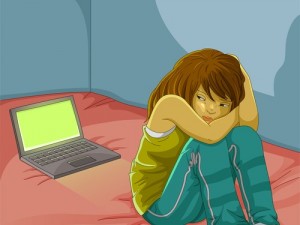Content Control Controversy : A Summary of Melissa King’s Article
In her article, “Better Online Living through Content Moderation”, Melissa King discuses the necessity of “content control features”, such as “block and ignore functions, content/trigger warnings, blocklists and privacy options”, on the internet and the “cultural opposition” against it. She explains that the these “tools” are helpful to “users [that] may suffer from PTSD and need to avoid topics and people that trigger their anxiety”. Kings argues that “nobody should be required to read or listen to content if they do not want to”.
She continues the article with talking about the oppositions raised against “content control”. The people against these “tools” retaliate by called the users of them “weak” and “too sensitive”. King suggests that the “opponents are creating a culture that pressures people to expose themselves to experiences far more catastrophic than they can handle” and that “it becomes entirely the victim’s problem when they are attacked online, no matter the situation, and they should ‘just deal with it'”. A common argument against “content control” is that the victims are just blowing things out of proportion and that “they should try being ‘less sensitive'”. King states that these arguments often result in an “informal parallel to Exposure Therapy”, which is “a type of therapy designed to combat severe anxiety through gradual and controlled exposure to its source, to inure an individual to these triggers and lesson the disruptions they can cause”. When people are discussing “content control” they often misinterpret the concept of “Exposure Therapy” and they fail to realize that “without controlled exposure, someone suffering from PTSD is likely to have their trauma magnified rather than reduced when faced with the triggering content”.
As she goes on, she provides more arguments against “content control”, such as the “myth” that when someone is harassed online, it is “merely mean words said on the internet, with no real threat to the safety or their family”. Some people do no believe that this harassment can cause PTSD because “according to popular culture, this is something only veterans suffer”. King disagrees with this idea and argues that it actually can. To support her argument she uses Caleb Lack, a clinical psychologist and psychology professor who specializes in treating anxiety disorders, as a source. She provides a quote from him saying:
“Bullying has long been known to have a severe impact on mental health, particularly if the bullying is repeated and prolonged… So, given what we know about PTSD, and given what we know about the effects of bullying (cyber and otherwise) on mental health, I think it’s relatively safe to say that “Yes, you can ‘get’ PTSD from Twitter.” One needs to be careful, though, to be specific about this: it’s the bullying and harassment that could lead to PTSD or PTSD symptoms (as well as depression, increased suicidality, and so on), not anything inherent to Twitter itself.”
Then, King discusses hate groups that are known for discouraging victims from the use of “content control”. One example of this is Gamergate, a group that is ” notorious for doing everything in its power to threaten people into silence– from calling and threatening family members, to posting pictures of their targets’ homes and addresses online”. She also argues that women are one of the main “targets” to online harassment when they are in “male dominated” areas, such as “the tech industry of in video game culture”. Two women that can testify to this are “Zoe Quinn (a video game developer and co-founder of Crash Override) and Anita Sarkeesian (creator of the YouTube channel ‘Feminist Frequency’ and the video series ‘Tropes vs Women in Video Games'”. She concludes the article with the argument that “people should be allowed to set their own personal boundaries and disregarding those personal boundaries should be seen as disrespectful at best”.
